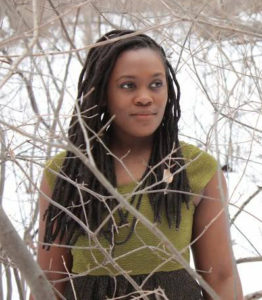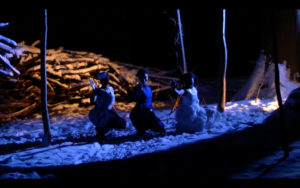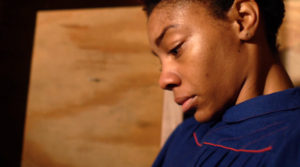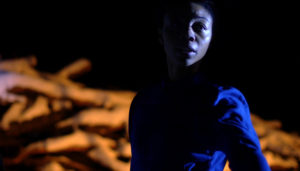Showcase Filmmaker Spotlight: Amber Monet
Showcase Filmmaker Spotlight: Amber Monet
By Travis Trew, Programming Associate

California native Amber Monet moved to Philly in 2012, transferring to Temple University as a sophomore dance major. A chance visit to the campus news studio led to a burgeoning interest in media production, and eventually to a change in majors. Several years later, Monet is a full-time, freelance editor of documentaries and narrative films, as well as a founding member of production company Daphne Pictures. She directed, edited, and photographed Freedom Beyond These 4 Walls, a project that also brought her back to her early passion for dance. Taking the true stories of escaped slaves on the Underground Railroad as inspiration, the film fuses poetic narration (written by poet Ashley Clarke) and dance to depict the journey to freedom of three young female slaves.
PFS: So you started out as a dancer, but made the transition to film in college. Why do you think you were drawn to film as a medium?
AM: There’s actually a connection, because I’ve danced my entire life—mostly modern and African. The rhythm and beats that I’ve grown to love and have passion for in dance I find a similarity to in film. Similar to dance, it’s very much about rhythm and beat, and I think that’s why I love editing as much as anything else. It can be really musical, even without audio. You don’t even have to say anything. It’s a movement. It’s an action. It’s just doing it on a different platform, which for me is the challenge and the excitement at the same time. So I definitely think my dance background strongly plays a role in getting to film. And I love watching movies. I love film, I love video, and I love documentaries. It’s something that I’ve always enjoyed and appreciated. But having gotten into film, I definitely think I have a different kind of appreciation for it, which has also been pretty awesome.
 PFS: How did this particular project come about?
PFS: How did this particular project come about?
AM: I got a newsletter from Film Freeway about a dance film festival and was like, “Wow this looks really cool. I think I should apply to this, but I don’t actually have a dance film. So I should probably make one.” That was in mid-November, and the deadline was in January. I contacted a friend of mine who’s a choreographer and said, “Hey, do you want to choreograph this? The only thing is that you have to finish in a month.” And he was like, “OK, sure!” I contacted a poet, told her the concept, and asked her to write a piece for it. And I just decided to do a dance film from there. As for the actual topic, I really love this show called Underground. I love the camera movement on that show. So I thought it would be cool if that were a dance piece, because there’s a lot of movement, and a lot of traveling, and a lot of open space to have fun and play with. So I was like, “I’m going to make a piece about the Underground Railroad, but have it completely based off of dance.” So we got the concept and everything by the middle of December. We filmed on one day in January at Alverthorpe Park, in 15˚ weather. Which was interesting but fun. I had three or four days to edit. It was kind of a crunch time, and then I sent it off to the film festival.
PFS: So was that your first time melding your dance background with film?
AM: Yes, it was.
PFS: How was that?
AM: It was surprisingly more difficult than I thought it would be. Continuity is a huge thing in film, of course. But when you’re dancing, and dancing with multiple people, it’s even harder, because it’s not as easy to do place markers and if a movement or an arm is even slightly different the second time, it totally throws everything off. And those are things that you have to look out for and be aware of. And you don’t realize that until you’re editing, and you’re like, “Wait a minute, where did this arm come from? Why is it turned this way?” It’s slight, and it’s subtle, but it makes a huge difference. But it was also fun because I was able to choreograph on set and give pointers to the dancers while filming. Things that somebody who didn’t have that dance background wouldn’t be able to say as a director.
PFS: The performers had to convey a really emotional narrative, all while dancing. Was that a challenge to direct?
AM: I think a lot of dancers are already naturally trained to do that, which is the beauty of it. Most of them are either officially actors or unofficially actors, where conveying emotion is a part of their movements. So it was actually pretty easy to do. When we cast it and held auditions, that was one of my main requirements. That was really how we went about casting people: by their emotional performance. Which makes it a lot easier when you’re filming and have a limited amount of hours to set up and shoot. To just say, “Hey I need more, I need that to go deeper,” and have somebody understand what that means just makes life so much easier. We were strategic about it from the beginning with whom we selected.
 PFS: What was the process of choreographing it like? Were you working with the poem already in place and choreographing it to that?
PFS: What was the process of choreographing it like? Were you working with the poem already in place and choreographing it to that?
AM: Because it was such a short turnaround our choreographer had only about two weeks to get it done. The poem was finished a little bit earlier and we would play it in rehearsal and the choreographer would start making movements line-by-line. The thing is, we didn’t actually record the actual version of the poem in voiceover until the day we shot. So the dancers didn’t get to hear the actual voiceover. They heard the writer, Ashley Clarke, reading it in rehearsal. Which I knew was going to be a challenge but, like I said, they’re professionals so I knew that they’d be able to adapt. But there’s a difference in timing. But I think they did a great job, and I was very proud of them. It was also during Winter Break, so a lot of our cast was going to be going away, so we had to do it before that took place.
PFS: With the poem, how much direction did you give Ashley in terms of the general narrative?
AM: We sat down and storyboarded, just kind of creating the skeleton for it together. After that I gave her the space to develop the story as she saw fit. We checked in a few times with the poem and I’d send my notes and things like that. We went back and forth throughout the process, but I still wanted to give her enough space to use her creativity and develop it how she wanted. So she wrote what she thought was best and then we talk about it after that.
PFS: Was finding locations that would at least be able to read as period accurate a challenge?
AM: Actually, it wasn’t. There’s a beautiful park called Alverthorpe Park in Jenkintown. It’s part of Abington Township, and my friend works for Abington Township so we were able to get a full tour of the park thanks to our location producer. And the park used to be owned, if I’m not mistaken, by a very wealthy investor. He owned a mansion as well as lots of open land. And a lot of the landmarks from 100-plus years ago are still there. It’s a historic park. We got to pick places where we wanted to shoot prior and have access the entire night. We were there from 4 PM until about 2 or 3 AM. So we actually lucked out with the location and didn’t run into any problems, besides the cold air and needing a huge generator because we were in the middle of the woods. But other than that, it worked out pretty well. Funnily enough, we had two other locations on our shot list but we weren’t able to reach them because it was so cold the dancers were numb. So we decided we were just going to use the one location for the sake of time and frostbite.
 PFS: You’re part of a production company called Daphne Pictures. Could you talk a little bit about what Daphne is all about and what you guys do?
PFS: You’re part of a production company called Daphne Pictures. Could you talk a little bit about what Daphne is all about and what you guys do?
AM: Sure. So Daphne Pictures is a media production company, but it’s mainly a lens to share stories that are not normally told. It’s aiming to shed light on powerful stories, events, places, and happenings that are usually invisible from the mainstream, or not as visible. And it’s giving other media platforms opportunities. So for example, poetry and dance are not as prevalent in film as maybe acting is. It’s also talking about economic, political, and social issues while producing quality media and providing substance for media makers to work, and make money and live, and continue to make work so that they can be sustainable.
Freedom Beyond These 4 Walls will screen on Thursday, August 10th at the Prince Theater’s Black Box as part of Philly Film Showcase, an exhibition supporting new work by talented, up-and-coming local filmmakers.